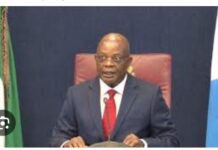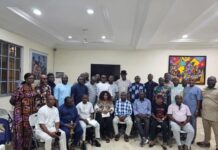An economist, she takes over as prime minister from Jean-Michel Sama Lukonde, following President Felix Tshisekedi’s sweeping re-election on December 20. The Democratic Republic of Congo’s planning minister Judith Suminwa Tuluka on Monday became the African nation’s first woman prime minister, state television announced.
An economist, she takes over as prime minister from Jean-Michel Sama Lukonde, following President Felix Tshisekedi’s sweeping re-election on December 20.
Tuluka said on national television that the “task is big, the challenges are immense but together… we will get there”.
“I am aware of the great responsibility that is mine,” she added, saying she wanted to work “for peace and development” so that the “Congolese people can benefit from the resources” of the country.
Tshisekedi officially triumphed with 73.47 per cent in the December vote and the vote passed largely peacefully in a country long torn by violence and instability.
The opposition branded the ballot a sham. Voting was officially extended by a day due to logistical snarls and polls were open for days after in remote areas.
Parties supporting Tshisekedi garnered more than 90 percent of the seats in parliament, allowing him to legislate with ease.
The new prime minister will be tasked with pushing the president’s declared priorities of employment, youth, women and national cohesion for the nation of about 100 million people.
Tshisekedi became president in 2019 promising to improve living conditions in DR Congo — which boasts mineral riches but has a largely impoverished population — and put an end to 25 years of bloodshed in the east.
Tshisekedi made little impact on those promises but campaigned for a second term on achievements such as free primary medication.
According to the United Nations, some seven million people have been internally displaced by conflict in the DR Congo, one of the world’s poorest countries.
The security situation has worsened in North Kivu province where a Rwanda-backed rebel group M23 has seized swathes of territory over the last two years.
After eight years of dormancy, the M23 rebellion took up arms again in late 2021, seizing large swathes of eastern North Kivu province — cutting off all land access to Goma except the Rwandan border road in early February.
The World Health Organization also sounded the alarm last month over the country’s worsening health situation, where cholera, measles, pox, anthrax and plague are wreaking havoc.
The health crisis is being exacerbated by violence, climate shocks, displacement, poverty and malnutrition, the WHO said, as it called for an urgent funding surge.
Some 15,000 UN troops deployed in the DRC started to leave at the end of February, at the request of the Kinshasa government. The withdrawal is due to be completed by the end of the year.










